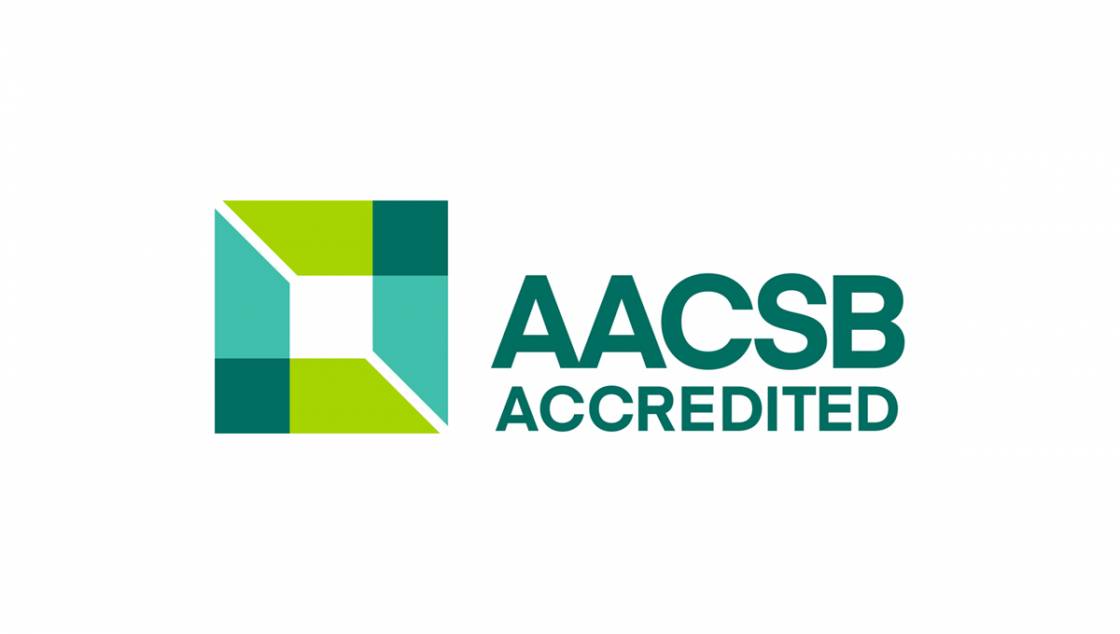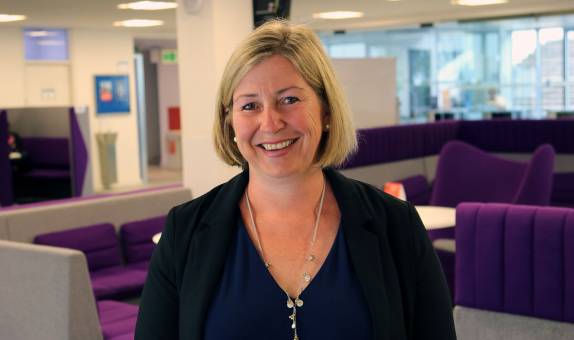Business Management and Digital Innovation BSc (Hons)

Teaching Excellence Framework (TEF) Gold award
Our commitment to high quality teaching has been recognised with a TEF Gold rating. The University has received an overall rating of Gold, as well as securing a Gold award in the framework's two new student experience and student outcomes categories.
Why choose this course?
The course will cover the fundamentals of the business ecosystem and the key current and future aspects of developing data and digital enhanced solutions in business. This area includes the disruptive nature of technology on business models and provides exposure to how technology can drive value in areas such as finance, marketing, supply chain, service design, sustainability and human resource management.
The course will prepare students to manage technology informed projects in a responsible and sustainable way. A key strand is entrepreneurship and design – developing students to respond proactively to current business problems and priorities.
| Attendance | UCAS code | Year of entry |
|---|---|---|
| 3 years full time | N294 | 2024 (Clearing) 2025 |
| 4 years full time including placement year | N295 | 2024 (Clearing) 2025 |
| 4 years full time including foundation year | N296 | 2024 (Clearing) 2025 |
Please note: Teaching on this course may take place on more than one KU campus.
| Main Location | Kingston Hill |
Reasons to choose Kingston University
- In just three years, you'll graduate with a business degree and the real-life practical experience and skills that employers are looking for.
- This course is designed and developed in collaboration with industry experts across different areas of the business world to ensure content reflects latest trends, challenges and practices.
- Graduate employability is embedded in module activities and extracurricular events such as networking with industry professionals, hackathons and speed interviewing.
- Kingston Business School has been recognised for quality by the Business Accreditation by the Association to Advance Collegiate Schools of Business (AACSB).This award is earned by just 5% of the world's business schools.
- The programme is delivered by a mix of industry professionals and academic researchers, offering a combination of practical industry insights and solid theoretical foundations for your studies
At Kingston Business School we lead
The Department of Management at Kingston Business School
The Department of Management offers a broad range of accredited undergraduate and postgraduate courses covering all areas of business, from human resources and finance, to marketing, logistics and management.
Our programmes are developed in consultation with industry practitioners and alumni to ensure that your studies are future-facing and enable you to thrive, whether your ambition is to start your own company or become a senior leader in a global organisation.
What you will study
Take a look at some of the content and modules that you may have the opportunity to study on this course:
Year 1
Year 2
Optional year
Final year
Year 1 introduces the foundations of business. You'll cover the environmental influences faced by organisations, and the key concepts of experience and service management. You'll also learn about disruptive technologies and how they can be used to deliver digital enhanced solutions for all areas of business, as well as developing innovative ideas through business design thinking.
Core modules
Global Business Environments
30 credits
This module introduces you to the external context in which organisations operate and in which you will eventually work. As potential managers of the future, defined as someone involved in assisting and directing members of an organisation to achieve their organisational objectives, you'll need to be equipped to understand the component parts of the external context within which organisations function.
The variety and complexity of the external environment and interactions with industries and organisations has a significant impact upon the way organisations and teams are structured. You will gain the skills and knowledge required to be able to research, critically appraise, compare businesses across territories, sectors and size.
Data and Digital in Business
30 credits
Disruptive Technologies are the ultimate challenge in change management impacting not only industry structures and strategic positioning; it affects all levels of an organisation and its extended supply chain. You will review the basis of disruptive innovation and examine these by researching technologies and applications of today.
This module also focuses on how data analytics and digital technologies are utilised by businesses to enable better decisions and alter consumer interactions. You will use a problem-centric approach applying analytical techniques with the aid of information technology, and the development of employability skills associated with these.
Service Mindset in Business Relationships
30 credits
This module introduces students to core topics and concepts of organisational behaviour and the development of a stakeholder-centric mindset. This includes the behaviour and management of people in work situations, customers interacting with organisations, stakeholders or partners in the sourcing/resourcing and delivery of the propositions organisations offer.
You will understand and research the behaviour and needs of stakeholder groups, frame and design experiences, connect, manage and measure these for business success. The module builds an understanding of the complexity of relationships for example, in and across global organisations and how these function in "best practice" situations; in building and managing relationships, partnerships and networks in start-up / smaller business situations.
Business Design Thinking
30 credits
Business design thinking is a set of methods and techniques applied to problems or opportunities to come up with ideas. You will gain an understanding of the challenges of managing creativity and innovation within organisations, and experience first-hand some of the typical problems faced in organisations today and work on ways in which to solve these creatively.
You will work with the input of real cases, external speakers and organisations and will be encouraged to present your ideas and findings.
In Year 2 you'll develop your problem-solving and decision-making skills in the broad context of business functions. You'll also look at value creation across all areas of business, developing effective marketing programmes, technology in focus, and sustainable and responsible management.
Core modules
Unlocking Business Value
30 credits
This module looks at value creation across all functions of the corporation for different industries and types of businesses. It starts with the evaluation of the KPI's of different types of businesses and their respective industries and how to do peer and industry analysis. It then moves to evaluating investment decisions, including capital budgeting, calculating project returns and how to choose the best projects that maximise returns for investment objectives and given risk constraints.
You will learn how to unlock value in a choice of capital structure and financing decisions in terms of instruments, markets where you issue and how you determine your optimal capital structure subject to a target cost of funding and other structural constraints. It finishes with a review of how to put all this together to be able to value a business. Throughout the module you will also be introduced to how negotiation has an impact on each area.
Developing Effective Marketing Programmes
30 credits
In all business environments today, there is a need to understand the ways in which effective marketing programmes and customer engagement can create the business impact outlined in business strategy. Communications skills are consistently high on the external skills requirements list. This module seeks to combine these elements to provide you with the important knowledge and skills that you will need to organise, manage, and create effective marketing and communications programmes.
Sustainable and Responsible Management
30 credits
The module covers the concepts and knowledge of sustainable business and supply chain management by looking at the ethical issues that emerge in the interactions between a business and its stakeholders and implementation of socially responsible and sustainable programmes and initiatives. You will study Environmental, Social and Governance (ESG), innovation, the triple bottom line – economic, environmental and social sustainability in the supply chains, uncertainty and risk management, stakeholder value and reputation.
In addition, the module will provide you with the project tools and techniques that focus on how to create a business case for sustainable projects, as well as utilising traditional and contemporary project and product delivery frameworks to support the delivery of sustainable benefits both to businesses, and a wider community of stakeholders. You will consider how investment decisions can incorporate ethics and risk.
Technology in Focus
15 credits
This module introduces the changing landscape of information architecture use in enterprises. You will study typical business information architectures, along with the changes that commoditisation, disruption, and new and emerging IT technologies have on business processes, services, and end-user behaviour. Delivered through practical work engaging with technologies, the module will demonstrate the important link between evolving business strategy and IT.
Digital Analytics for Business
15 credits
This module will provide you with the fundamental knowledge and skills required to analyse digital data using appropriate technologies. Students will explore how data-driven insights drive data-based decision making with hands-on experience in using scripting languages for digital data analytics. The module enables students to use appropriate data preparation, storage, analysis and visualisation skills to generate value for business stakeholders.
Study abroad optional year
You have the option to take an additional year to study abroad or to undertake a year-long work placement (or even a mix of both).
Your final year develops your critical understanding and your ability to contribute to strategic thinking in both local and global business, driving innovation to deliver both financial and social value. You'll look at leadership in changing environments and be supported to grow your own leadership skills.
You'll also be able to expand your knowledge and skills within marketing, L&D, digital design and customer relationship management.
Core modules
Building Business Strategy
30 credits
This module covers the concepts, theories and techniques on which strategic management is based and explores their application in a wide range of international business and other settings.
It aims to expand students' perspective on wider issues and scenarios, identifying opportunities and growth over medium and long terms. You will develop your ability to communicate and present your commercial awareness across the board.
Leadership, Transformation and Complexity
30 credits
This module addresses complexity and sense making techniques to identify changes in the environment. It includes theoretical and practical perspectives of effective and responsible leadership in contemporary complex and changing organisational contexts. You will critically evaluate concepts of leadership alongside current practices of leading change in contemporary organisations faced with complex and uncertain environments.
You will critically reflect on your own leadership capacity and skills in initiating and leading change in different contexts, and consider your own progress and career journey in the context of these environments and leadership styles.
Digital Innovation and Transformation
30 credits
This module will give you an understanding of the digital innovation process and its role in driving business transformation. The module covers the principles, strategies, and practices of digital innovation and transformation, including the key technologies, platforms, and tools that enable innovation in the digital age. You will learn how digital innovation can transform businesses, create new business models, and new ways of working. The module enables you to develop consultancy skills through working with key stakeholders in identifying opportunities for digital innovation and applications of transformation strategies to generate value for customers and stakeholders alike.
Optional modules
Professional Experience
15 credits
You will reflect upon the skills acquired in attaining your internship, alongside the conceptual and theoretical knowledge developed through your study of the core curriculum.
You will prepare a brief for future students on how to make the most out of their internship, through the form of either a blog post, video, vlog (video blog), podcast or poster presentation
Digital Creativity in Marketing
15 credits
This module will enable you to understand specific techniques and best practices in digital marketing communications and engagement. You will gain hands-on experience of the latest developments in digital marketing communications and business tools and technology, such as search engine marketing, mobile marketing, social media, big data and analytics.
You will combine previously learned theoretical perspectives and practical applications and apply these to contemporary or live digital marketing challenges, providing creative responses.
The Learning Organisation
15 credits
This module addresses the need for Learning and Development (L&D) to be delivered in a strategic manner to enhance both individual performance and organisational success. You will develop an understanding of the status of L&D strategies in organisations, how to design and deliver responses to contemporary challenges and problems in L&D, as well as L&D technology.
Drawing upon knowledge acquired from a range of other modules, you will learn how to design successful knowledge management programmes.
Data and Digital Driven Design
15 credits
This module introduces the principles of using digital driven design to support compelling data narratives. This will equip you with the knowledge, skills and technologies required to manage and design a typical information architecture solution using an agile management approach on top of data foundations.
You will gain experience in Agile; in designing and implementing a prototype mobile and web application; in learning about modelling data and the importance of navigation and search, and in understanding data provenance, life cycles, and presentation.
CRM and Customer Success
15 credits
You will establish an understanding of Customer Relationship Management (CRM) as a comprehensive customer-centric approach to an organisation's strategy of acquiring, enhancing, and retaining its customers, and in some cases, a wider group of stakeholders (e.g. students, charity donors).
This module shows how CRM is based on a particular approach to business/marketing strategy/policy, business processes, customer service, employee training, marketing, sales, system applications and information management. An effective CRM strategy and system can reinforce sustainability and profitability of a business, so this module focuses on the business strategy associated with CRM and reflects upon specific strategic situations in which CRM might be deployed effectively.
This module also provides the opportunity to gain hands-on experience using an available commercial CRM software package to support business intelligence generated from CRM initiatives in support of marketing strategies, customer segmentation, customer retention measures and product offerings. You will also familiarise yourself with the notion of customer success and the roles in much demand in the contemporary marketplace.
Foundation year: Business
If you would like to study this business degree at Kingston University but are not yet ready to join the first year of a BSc(Hons) course, you may want to consider studying this course with a foundation year.
The foundation year in business is part of a four-year degree and is taught at Kingston College, close to Kingston University's Penrhyn Road campus. You'll be introduced to professional skills, numerical concepts, business IT, marketing, customer care and business law.
Future Skills
Knowledge to give you the edge
Embedded within every course curriculum and throughout the whole Kingston experience, Future Skills will play a role in shaping you to become a future-proof graduate, providing you with the skills most valued by employers such as problem-solving, digital competency, and adaptability.
As you progress through your degree, you'll learn to navigate, explore and apply these graduate skills, learning to demonstrate and articulate to employers how future skills give you the edge.
At Kingston University, we're not just keeping up with change, we're creating it.

Kingston Business School Accreditations
Kingston Business School holds the prestigious international accreditation by the AACSB (Association to Advance Collegiate Schools of Business) in recognition of the excellence of its business education. This accreditation has been earned by just 5% of the world's business schools and recognises the high quality and standard of our business degree offerings.
Specialist careers support
You will take part in an Assessment Centre Experience, providing the opportunity to experience the pathway to employment with tailored feedback to help develop your employability skills for the world of graduate employment.
- Develop your understanding of the jobs market, including current trends and opportunities, different recruitment processes and how to identify relevant roles
- Receive personalised feedback reports to help you to improve and progress
- Access additional webinars on top tips, employer expectations and best practice

Entry requirements
If you would like to join us through Clearing 2024, please call our Clearing line on 0800 0483 334 (or +44 020 8328 1149 if you are calling from outside the UK) and speak to our friendly and knowledgeable hotliners who will be able to provide information on available courses and will guide you through your options.
Please note the entry requirements listed below are for 2025 entry only.
Teaching and assessment
Scheduled learning and teaching on this course includes timetabled activities including lectures, seminars and small group tutorials.
Who teaches this course?
You will be taught by an experienced teaching team whose expertise and knowledge are closely matched to the content of the modules on this course. The team includes senior academics and professional practitioners with industry experience. Student academic mentors also provide support during certain tutorials / seminars, under the supervision of the module leader.
The following group of staff members are currently involved in the delivery of different elements of this course. This pool is subject to change at any time within the academic year.
Course fees and funding
Additional costs
Depending on the programme of study, there may be extra costs that are not covered by tuition fees which students will need to consider when planning their studies. Tuition fees cover the cost of your teaching, assessment and operating University facilities such as the library, access to shared IT equipment and other support services. Accommodation and living costs are not included in our fees.
Where a course has additional expenses, we make every effort to highlight them. These may include optional field trips, materials (e.g. art, design, engineering), security checks such as DBS, uniforms, specialist clothing or professional memberships.
Work placements
Our course offers a work placement to help you develop your skills and gain invaluable experience, this option will also help you to:
- Improve your career choices: Business experience and placements help you to make better-informed career choices and help you stand out from the competition when you look for a job.
- Help with your studies: Statistics indicate that on average students who do placements get better results in their final year.
- Develop your professional skills: Preparing you for your career
- Increase your employability: Each year many of our students receive graduate job offers from their placement employer.
After you graduate
This course will enable graduates to work in a variety of organisations, from large companies to SMEs. Some start their own businesses or progress to postgraduate degrees and professional qualifications.
Kingston Business School: who do you want to be?
Key information set
The scrolling banner(s) below display some key factual data about this course (including different course combinations or delivery modes of this course where relevant).
Course changes and regulations
The information on this page reflects the currently intended course structure and module details. To improve your student experience and the quality of your degree, we may review and change the material information of this course. Course changes explained.
Programme Specifications for the course are published ahead of each academic year.
Regulations governing this course can be found on our website.


















